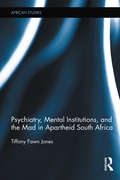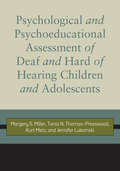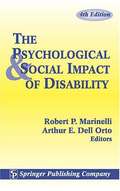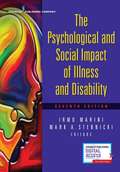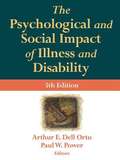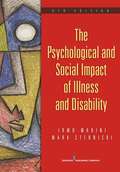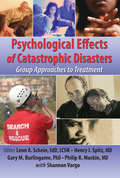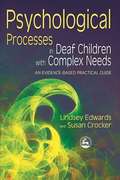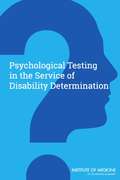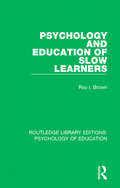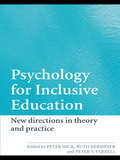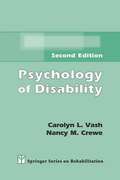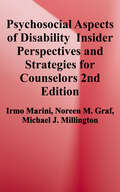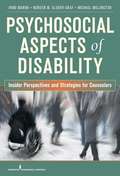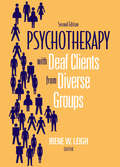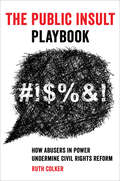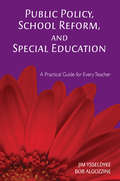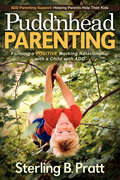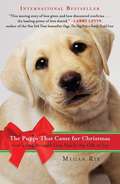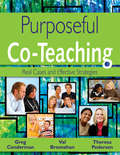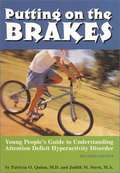- Table View
- List View
A Psychiatrist Works with Blindness
by Louis S. CholdenEach patient will react to blindness in a manner characteristic for his personality. He will react to it as an emergency situation which will have most serious consequences for his future life plans. Besides the emergency aspect of the loss of vision, blindness in itself holds a number of special and deep meanings to the patient which must be considered in attempting to understand its effects. These meanings may be discussed from the psychologic, social and vocational points of view. But, because the patient will react to the problem of blindness in a way which is peculiar to him, one might predict within certain limits what the patient's reactions will be, providing we understand his personality structure.
Psychiatry, Mental Institutions, and the Mad in Apartheid South Africa (African Studies)
by Tiffany Fawn JonesIn the late 1970s, South African mental institutions were plagued with scandals about human rights abuse, and psychiatric practitioners were accused of being agents of the apartheid state. Between 1939 and 1994, some psychiatric practitioners supported the mandate of the racist and heteropatriarchal government and most mental patients were treated abysmally. However, unlike studies worldwide that show that women, homosexuals and minorities were institutionalized in far higher numbers than heterosexual men, Psychiatry, Mental Institutions and the Mad in Apartheid South Africa reveals how in South Africa, per capita, white heterosexual males made up the majority of patients in state institutions. The book therefore challenges the monolithic and omnipotent view of the apartheid government and its mental health policy. While not contesting the belief that human rights abuses occurred within South Africa’s mental health system, Tiffany Fawn Jones argues that the disparity among practitioners and the fluidity of their beliefs, along with the disjointed mental health infrastructure, diffused state control. More importantly, the book shows how patients were also, to a limited extent, able to challenge the constraints of their institutionalization. This volume places the discussions of South Africa’s mental institutions in an international context, highlighting the role that international organizations, such as the Church of Scientology, and political events such as the gay rights movement and the Cold War also played in shaping mental health policy in South Africa.
Psychoeducational Assessment of Students Who Are Visually Impaired or Blind: Infancy Through High School
by Sharon Bradley-JohnsonDiscusses administering psychological tests to students who are blind.
Psychological and Psychoeducational Assessment of Deaf and Hard of Hearing Children and Adolescents
by Margery S. Miller Jennifer Lukomski Tania N. Thomas-Presswood Kurt MetzThe obstacles to valid and meaningful assessment of deaf and hard of hearing children and adolescents are great, yet professionals are regularly asked to conduct comprehensive evaluations to determine resource and program eligibility, test modifications in school, classroom and home recommendations, and referrals. In this important new text, the authors define the skills required of the examiners, explain the complex nature of these assessments, and describe ways to intelligently use existing tests. Authors Margery S. Miller, Tania Thomas-Presswood, Kurt Metz, and Jennifer Lukomski bring a wealth of knowledge and experience to this in-depth treatment of topics essential to educators and school psychologists. They cover such critical areas as test construction and measurement; the diversity in American Deaf culture; the role of parents in the assessment process; neuropsychological assessments; nonverbal methods for assessing intelligence; and the need for sign language competency when testing cognitive and language skills. The text concludes with recommendations for the development of valid and reliable tests for all students who are deaf and hard of hearing.
The Psychological And Social Impact Of Disability
by Robert P. Marinelli Arthur E. Dell OrtoMarinelli and Dell Orto continue the premise of their earlier editions of this widely adopted text and present a realistic perspective on disability. Carefully selected articles and personal narratives capture the unique aspects of the psychological and social effects of disability. Formatted to include thought-provoking study questions and disability awareness exercises, this text is recommended for students in rehabilitation counseling and physical therapy education programs, as well as professionals in rehabilitation, psychology, and social work.
The Psychological and Social Impact of Illness and Disability
by Irmo Marini Mark A. StebnickiNow in its seventh edition, this bestselling classic continues to be the most comprehensive and diverse text available on the psychosocial aspects of illness and disability. It is substantially revised to reflect the growing disparity between the haves and the have-nots and incorporates social justice issues throughout the text. In addition to new and updated information integrated throughout the book, the seventh edition features two new chapters addressing social justice in regards to depression and disability, and the psychosocial aspects of grief, death, and dying. Additionally, the text now includes an Instructor’s Manual and PowerPoint slides. Combining a mix of seminal work from rehabilitation counseling legends with current theoretical and treatment approaches, the book provides a practical, real-life perspective and offers broad and inclusive coverage of the day-to-day challenges of working with a diverse and marginalized population. Additionally, the text analyzes barriers to enabling patients with disabilities and improving their quality of life. Chapter objectives, review questions, and personal narratives in each chapter facilitate in-depth learning.
The Psychological and Social Impact of Illness and Disability (5th Edition)
by Paul W. Power Arthur E. Dell OrtoThis collection, which defines disability very broadly to include post-traumatic stress and normal aging, includes classic articles and discussion questions as well as new material on illness. With a few exceptions it concentrates on the needs of caregivers and those who seek to rehabilitate people with disabilities. Therefore articles cover such issues as definitions of disability and current or past models, shifts in expectations of care demanded by the disabled, perceptions of stages of adjustment to disability, differences in the experience of men and women, the difficulties in discerning the quality of life from outside disability, sexuality, methods of intervention and treatment to promote acceptance o a disability, family issues surrounding life and death, special resources such as assistive technology and spirituality, new applications of eugenics and euthanasia, and "quality aging." Includes exercises and narratives about disability, primarily by caregivers.
The Psychological and Social Impact of Illness and Disability (Sixth Edition)
by Irmo Marini Mark StebnickiExamines current thought and treatment approaches in working with individuals with disabilities. Abundant and insightful narratives by disabled individuals offer a bridge between theory and practice for students in rehabilitation psychology and counselling courses.
Psychological Effects of Catastrophic Disasters: Group Approaches to Treatment
by Joseph Rose Henry I Spitz Leon Schein Gary Burlingame Philip R. MuskinA thorough, user-friendly guide of basic knowledge and group interventions for psychological trauma from terrorist attacks and other catastrophic disastersThere is relatively little literature on the psychological trauma caused by catastrophic disasters, including terrorist attacks and the impending threats of terrorism. Psychological Effects of Catastrophic Disasters: Group Approaches to Treatment fills that gap by comprehensively discussing ways to minimize the psychological damage resulting from catastrophic disasters as well as the trauma developed from the threat of future terrorist attacks. The book provides thorough presentations of almost manualized group methods for the prevention and treatment of the acute and longer-term psychological effects for children, adolescents, and adults.Appropriate treatment immediately after a catastrophe can diminish harmful psychological effects, enhance an individual&’s quality of life, decrease psychosomatic illnesses and the exacerbation of chronic medical conditions, increase the effective utilization of medical facilities, and decrease medical expenses. In this book, internationally renowned authorities provide practical expert suggestions and helpful examples to illustrate the interventions and provide a quick reference for professionals facing the aftermath of prospective terrorist disasters and other catastrophic events. Psychological Effects of Catastrophic Disasters: Group Approaches to Treatment is divided into four sections. The first section provides an overview of the book; the second discusses the foundations and broad issues which potentially affect the outcome of group treatment; the third section presents group models which address the particular needs of children, adolescents, parents, emergency service personnel, and mental health practitioners; and the fourth part considers future directions of treatment. Designed to be used as a comprehensive single source for professionals working with victims of trauma caused by terrorism or catastrophic disaster, this book can be read and used in its entirety, or specific chapters detailing treatments can be chosen and used independently as needed. Extensive references allow opportunities for further research.Psychological Effects of Catastrophic Disasters: Group Approaches to Treatment presents unique first-person accounts of September 11th and examines: the neurobiological effects of a traumatic disaster the effective use of psychotropic medication the implications of living with ongoing terrorist threats a new framework for preparedness and response to disasters and trauma for children and families cultural, religious, and ethnic differences related to the prevention and treatment of psychological sequelae the diagnosis and treatment of traumatic grief retraumatization, distressing reminders, and their effects on post-traumatic adjustment the knowledge trauma therapists need to integrate small group principles the diagnosis and group treatment of acute and long-term effects with adults and children the use of spiritual principles after a terrorist disaster or catastrophic event nine types of groups appropriate for specific populationsPsychological Effects of Catastrophic Disasters: Group Approaches to Treatment is a timely, comprehensive reference for social workers, psychologists, psychiatrists, health professionals, mental health professionals, educators, and students.The royalties from this book shall be donated to organizations which provide direct services to those who continue to be affected by the events of September 11th, 2001 and Hurricane Katrina (August 29th, 2005).
Psychological Processes in Deaf Children with Complex Needs: An Evidence-Based Practical Guide
by Susan Crocker Marschark Lindsey Edwards`This volume offers a broad perspective on psychological processes in children with complex needs. Armed with this valuable tool, professionals, parents, and educators will be much better prepared to offer deaf and hard of hearing children the support and opportunities they deserve.' - from the Foreword by Marc Marschark Psychological Processes in Deaf Children with Complex Needs is a concise and authoritative guide for professionals working with deaf children and their families. The effects of hearing impairments on learning, social development and family life can be profound. They can impact on attachment, parenting and family interaction, and can affect cognitive and neuropsychological processes including perception and memory. This guide draws on the latest evidence to explain the impact of hearing impairment and uses case studies to focus on the key issues for assessment and intervention. It also suggests practical strategies for treatment and development for those working with hearing impaired children.
Psychological Testing in the Service of Disability Determination
by Committee on Psychological Testing Including Validity Testing for Social Security Administration Disability DeterminationsThe United States Social Security Administration (SSA) administers two disability programs: Social Security Disability Insurance (SSDI), for disabled individuals, and their dependent family members, who have worked and contributed to the Social Security trust funds, and Supplemental Security Income (SSSI), which is a means-tested program based on income and financial assets for adults aged 65 years or older and disabled adults and children. Both programs require that claimants have a disability and meet specific medical criteria in order to qualify for benefits. SSA establishes the presence of a medically-determined impairment in individuals with mental disorders other than intellectual disability through the use of standard diagnostic criteria, which include symptoms and signs. These impairments are established largely on reports of signs and symptoms of impairment and functional limitation. "Psychological Testing in the Service of Disability Determination" considers the use of psychological tests in evaluating disability claims submitted to the SSA. This report critically reviews selected psychological tests, including symptom validity tests, that could contribute to SSA disability determinations. The report discusses the possible uses of such tests and their contribution to disability determinations. "Psychological Testing in the Service of Disability Determination" discusses testing norms, qualifications for administration of tests, administration of tests, and reporting results. The recommendations of this report will help SSA improve the consistency and accuracy of disability determination in certain cases.
Psychology and Education of Slow Learners (Routledge Library Editions: Psychology of Education)
by Roy I. BrownOriginally published in 1976, this introductory text for those intending to work with slow learners was concerned with the practical implications of recent British and North American research in the field of psychology and education at the time. Slow learners are young people who for a variety of reasons, continuously or for long periods, under-function in terms of intelligence, educational attainment and social skills. This book offers a clear analysis of the problems facing slow learners, their psychology and the types of education open to them. Dr Brown reassesses the needs of disabled children and adults in the context of their families, with the emphasis on the practical level of activity and training possible for them. The aim is the integration of the disabled person in society, and the belief is that services for the disabled should be integrated, with no professional person working on an isolated basis, but as part of a multidisciplinary professional team. Design for individuals entering the field of teaching, particularly those concerned with special education, training and rehabilitation programmes, the book should also be of value to social workers, psychologists and other professional people working in the field, as well as to parents of disabled children.
Psychology for Inclusive Education: New Directions in Theory and Practice
by Peter Hick Ruth Kershner Peter T. FarrellWhat can psychology offer inclusive education? Traditionally, special education has looked to psychology for many of its theoretical resources and practical strategies. While those seeking to promote more inclusive education have tended to see psychology and psychologists as part of the problem by providing a rationale for segregation. However, in practice many psychologists today are developing inclusive ways of working, and are paying attention to psychological theories that underpin inclusive education. Psychology for Inclusive Education reframes the contribution of psychology in terms of its relevance to inclusion and will show how psychological theories of learning and human development are compatible with inclusive education. Part 1 explores psychological theories relevant to understanding inclusive education and Part 2 looks at how psychology can contribute to promoting more inclusive education in practice. Chapters cover: how psychologists can collaborate with teachers for inclusive solutions Vygotsky's theories of learning and their significance for inclusion the challenge of developing pedagogies for inclusion sociocultural understandings of learning in inclusive classrooms the role of emotion in learning and inclusion cooperative learning and inclusion the challenges and tensions of inclusion and high standards for schools the practice of dynamic assessment as an inclusive alternative to IQ social justice and inclusive psychology Bringing together a highly distinguished list of international contributors from the UK, USA and South Africa and including practising educational psychologists, this book will link theory to practice in schools and classrooms. International in focus and at the very cutting edge of the field, this is essential reading for all those interested in the development of inclusive education.
Psychology of Disability (2nd edition)
by Carolyn L. Vash Nancy M. CreweThe latest edition, 20 years after the first, incorporates the many changes that have occurred in disability-related language, legislation, technology, and research. Its two sections focus first on the disability experience a chronicle of what it's like to be disabled and how objective and subjective experiences affect the basic functions of living, working, and playing and then on interventions a response to the problems and sources of psychological pain exposed by the discussions in the first section. Vash (a writer and consulting psychologist in Altadena, Calif. ) and Crewe (Michigan State U. ) see their work as both a textbook or collateral reading source for those studying the psychological aspects of disability, and a general resource for rehabilitation professionals.
Psychosocial Aspects of Disability: Insider Perspectives and Strategies for Counselors
by Irmo Marini Noreen M. Graf Michael J. MillingtonWhat are the differences between individuals with disabilities who flourish and those who never really adjust after a trauma? How do those born with a disability differ from individuals who acquire one later in life? <p><p>Fully updated and revised, this second edition of a unique rehabilitation counseling text reflects growing disparities among "haves" and "have-nots" as they bear on the psychosocial aspects of disability. New content focuses on returning veterans afflicted with physical and mental health problems, persons with disabilities living in poverty, and the need for increased family and community-based engagement. The book provides updated information about assisted suicide, genetic testing, new legislation, and much more. <p><p>Using a minority model perspective, the text provides students and practitioners of rehabilitation and mental health counseling with vivid insight into the experience of living with a disability. It features first-person narratives from people living with a variety of disabling conditions, which are integrated with sociological and societal perspectives toward disability, and strategies for counseling such individuals. The text encompasses a historical perspective, psychological and sociological research, cultural variants regarding disability, myths and misconceptions, the attitudes of special interest and occupational groups, the use of positive psychology, and adjustments to disability by the individual and family. A wealth of counseling guidelines and useful strategies is geared to individuals with specific disabilities. Designed for a 15-week semester, the book also includes thought-provoking discussion questions and exercises.
Psychosocial Aspects of Disability: Insider Perspectives and Counseling Strategies
by Irmo Marini Noreen M. Glover-Graf Michael Jay MillingtonWhat a marvelous and amazing textbook. Drs. Marini, Glover-Graf and Millington have done a remarkable job in the design of this highly unique book, that comprehensively and very thoughtfully addresses the psychosocial aspects of the disability experience. These highly respected scholars have produced a major work that will be a central text in rehabilitation education for years to come. From the Foreword by Michael J. Leahy, Ph. D. , LPC, CRC Office of Rehabilitation and Disability Studies Michigan State University This is an excellent book, but the best parts are the stories of the disabled, which give readers insights into their struggles and triumphs. " Score: 94, 4 Stars--Doody's Medical Reviews What are the differences between individuals with disabilities who flourish as opposed to those who never really adjust after a trauma? How are those born with a disability different from individuals who acquire one later in life? This is the first textbook about the psychosocial aspects of disability to provide students and practitioners of rehabilitation counseling with vivid insight into the experience of living with a disability. It features the first-person narratives of 16 people living with a variety of disabling conditions, which are integrated with sociological and societal perspectives toward disability, and strategies for counseling persons with disabilities. Using a minority model perspective to address disability, the book focuses on historical perspectives, cultural variants regarding disability, myths and misconceptions, the attitudes of special interest and occupational groups, the psychology of disability with a focus on positive psychology, and adjustments to disability by the individual and family. A wealth of counseling guidelines and useful strategies are geared specifically to individual disabilities. Key Features: Contains narratives of people living with blindness, hearing impairments, spinal cord injuries, muscular dystrophy, polio, mental illness, and other disabilities Provides counseling guidelines and strategies specifically geared toward specific disabilities, including "dos and don'ts" Includes psychological and sociological research relating to individual disabilities Discusses ongoing treatment issues and ethical dilemmas for rehabilitation counselors Presents thought-provoking discussion questions in each chapter Authored by prominent professor and researcher who became disabled as a young adult
Psychosocial Aspects of Disability (Fourth Edition)
by George Henderson Willie V. BryanThis new edition of Psychosocial Aspects of Disability strikes a balance of past, present, and future views of individual, family, societal, and governmental interaction and reaction to persons with disabilities. The past is presented in Part 1, Psychosocial Aspects of Disabilities, in which a view of the evolution of societal reactions to disabilities and persons with disability is presented. This perspective is important because it explains how some of the beliefs and attitudes toward disabilities and those who have a disability have developed. Additionally, Part 1 makes us aware from a historical perspective why persons with disabilities have been subject to certain types of treatment from family, friends, and society. Parts 2 and 3 provide discussion of present situations for persons with disabilities as they move toward better inclusion in society. Chapter 5 discusses the need for empowerment of persons with disabilities and how they can empower themselves. Chapter 6 discusses the need for better employment opportunities for persons with disabilities because this is a significant way of empowering persons with disabilities. Chapter 7 discusses federal legislation that has been developed to facilitate the empowerment of persons with disabilities. Part 4, Psychosocial Issues, to a large extent, represents the future for persons with disabilities. The chapters in this section discuss some disability issues that some persons with disabilities will encounter and/or by which they will be affected during the twenty-first century. Additionally, there is discussion of the need for persons with disabilities to attain the full human rights to which they are entitled.
Psychotherapy With Deaf Clients From Diverse Groups
by Irene W. LeighThe second edition of Psychotherapy with Deaf Clients from Diverse Groups features the introduction of six new chapters that complement full revisions of original chapters with advances in the field since its initial publication. The first part begins with a new chapter on the current ethical issues relevant to working with deaf clients. In subsequent chapters it provides updated information on the diversity of consumer knowledge, attitudes, beliefs, and experiences. Deaf therapists and their involvement in the Deaf community also are scrutinized in this context. The revised second part examines psychotherapy for various constituencies, including deaf women; lesbian, gay, and bisexual deaf populations; children of deaf parents; and people with Usher syndrome. Part Three chapters consider interventions with African American deaf clients, American Indians who are deaf, and Asians who are American and deaf. A new chapter expands information on therapy for Latino deaf clients. The final section incorporates three new chapters on other deaf populations -- deaf college students, recipients of cochlear implants, and deaf elderly clients. Also, new information has been added to chapters on the treatment of deaf survivors of sexual abuse and deaf clients with chemical dependency. The last addition to the second edition outlines dialectical behavior therapy for deaf clients, a valuable option for clinicians.
The Public Insult Playbook: How Abusers in Power Undermine Civil Rights Reform
by Ruth ColkerWhen they go low, we learn: an examination of mudslinging in contemporary American politics—and how the left can find its footing to achieve structural reform in this mess. The rules of the public discourse game have changed, and The Public Insult Playbook argues that the political left needs to account for the power of vitriol in crafting their theories for social and political change. With this book, noted constitutional law expert and disability rights advocate Ruth Colker offers insights into how public insults have come to infect contemporary public discourse—a technique not invented by but certainly refined by Donald Trump—and, importantly, highlights lessons learned and tools for fighting back. Public insults act as a headwind and dead weight to structural reform. By showcasing the power of insults across a number of civil rights battlegrounds, The Public Insult Playbook uncovers the structural nature of personal attacks, and offers a blueprint for a legal and political strategy that anticipates the profound but poorly understood damage they can inflict to whole movements. Illustrating how completely the tactic has been adopted and embraced by the American right wing, the book catalogues how public insults have been used against people with disabilities, immigrants, people seeking abortions, individuals who are sexually harassed, members of the LGBTQ community, and, of course, Black Americans. These examples demonstrate both the pervasiveness of the deployment of insults by the political right and the ways in which the left has been caught flat-footed by this tactic. She then uses the Black Lives Matter movement as a case study to consider how to effectively counter these insults and maintain an emphasis on structural reform.
Public Policy, School Reform, and Special Education: A Practical Guide for Every Teacher
by Bob Algozzine Dr James E. YsseldykeCase studies illustrate how social, political, and economic factors affect special education practices and the distribution of limited resources to students with special needs.
Pudd'nhead Parenting: Forming a Positive Working Relationship with a Child with ADD
by Sterling B. PrattParenting can be worrisome and challenging. If your child struggles with ADD it can be incredibly frustrating and absolutely bewildering. Understanding what is going on inside your child's head is the first step. Helping them understand themselves starts their momentum. You and your child working together in a positive relationship will carry them through to a positive outcome, whatever that is meant to be. Pudd'nhead Parenting addresses the much neglected but critical topic of how to form the right relationship with your child. You can watch them struggle with ADD despite your best efforts, or you can become a positive and supportive influence. Pudd'nhead Parenting teaches you how to employ your best parenting instincts to lift your child out of the quagmire of ADD and help them find direction, learn life skills and go on to become who they really are. Years from now your child will thank you for taking the steps outlined in this book.
The Puppy That Came for Christmas: And Brought One Family the Gift of Joy
by Megan RixMarley, Oogy, Huck-and now, Traffy, the "forever dog" that changed one couple's life. All Megan Rix ever wanted was a baby. Yet, month after month, Megan's dreams were dashed. Would her life ever feel complete? Megan and her husband, Ian, found a surprising answer when they began training golden retriever pups to become service dogs for people with disabilities. But opening their homes and hearts up to Emma, and then Freddy-only to have each move on after six months-eventually took its own toll. Megan and Ian didn't know if they could continue. Then, one Christmas, little Traffy came along . . . and stayed. An instant U. K. bestseller, The Puppy That Came for Christmas is a heartwarming and inspirational story that will captivate dog lovers everywhere.
Purple Fest 2023 Booklet
by Office of the State Commissioner for Persons with Disabilities GoaThe booklet shines a light on the Purple Fest 2023, India's first-of-its-kind inclusive festival, took place from 6th to 8th January 2023 in Goa. Organized by the Office of the State Commissioner for Persons with Disabilities in association with various government departments, the festival aimed to create a welcoming and inclusive world for everyone. With over 5,000 delegate registrations, including individuals from the disabled community, the event promoted education, respect, and celebration of diversity. The festival featured activities such as Purple Think Tank sessions to empower persons with disabilities, sports events to highlight the need for more opportunities in Para games, Jagruti Mela for interactions with service providers, and Purple Dialogue with experts to develop policies for advocacy at local and national levels. With 1000 local volunteers and 50,000 visitors, Purple Fest showcased the power of inclusivity and the capabilities of individuals with disabilities.
Purposeful Co-Teaching: Real Cases and Effective Strategies
by Gregory J. Conderman Mary V. Bresnahan Theresa PedersenCreate powerful teaching partnerships that promote success for every student in inclusive classrooms! Ideal for both general and special education classrooms, this indispensible resource integrates interpersonal skills, instructional design, and teaching philosophy to guide educators through the beginning stages of co-teaching relationships toward smooth collaboration. The authors provide proven instructional strategies such as visuals, mnemonics, formative assessment, and more, for use within co-teaching partnerships. Additional resources include: Chapter activities and checklists for planning lessons Case studies from various subject areas and grade levels to illustrate the realities of co-teaching Resources such as books, videos, and helpful Web sites
Putting on the Brakes (Revised Edition): Young People's Guide to Understanding Attention Deficit Hyperactivity Disorder
by Patricia O. Quinn Judith M. SternExplains what attention deficit disorder is and how to treat it, discussing the cognitive and emotional aspects, what the medication options are, how to maintain positive relations with friends, and how to do well at school.

